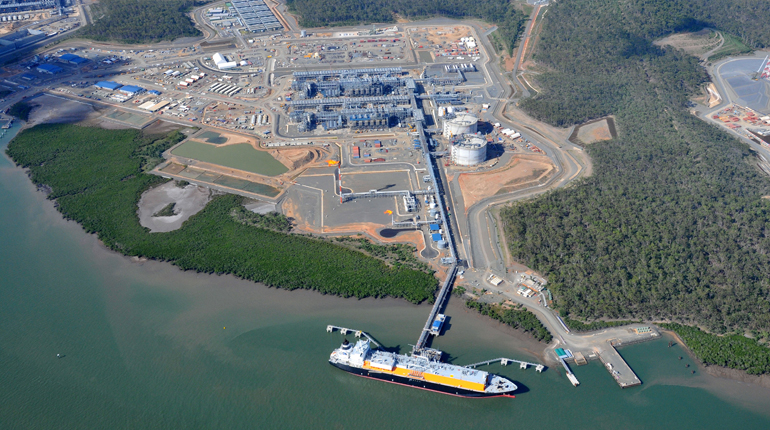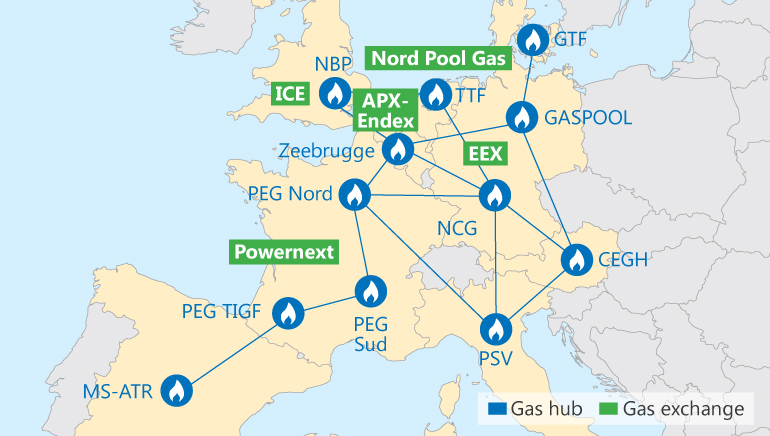 The impact of the startup of three new LNG facilities in Queensland is already being felt. (BG Group)
The impact of the startup of three new LNG facilities in Queensland is already being felt. (BG Group)
Australia’s gas industry is facing tough times at home as well as abroad, with regulators looking to tighten control over privately owned gas networks and increase transparency in wholesale trading.
A set of recommendations from the Australian Competition and Consumer Commission (ACCC), released last week, has stepped up pressure on gas suppliers in the populous eastern and southern states. Industrial users in the east and south say new LNG projects starting up and a lack of competition have overinflated prices and created a looming supply shortage.
The general market downturn has triggered a marked drop in exploration investment that risks hobbling the market even further, the ACCC said.
ACCC Chief Executive Rod Sims announced the recommendations, which include tougher network regulation, more data transparency and increased supply competition in southeast Australia. "While market conditions have been difficult, it is important new supply comes online and new opportunities are developed," Sims said. "More supply, new suppliers and an increased diversity of supply sources are crucial for the future competitiveness of, and pricing in, the gas market," he added.
Among the recommendations is a proposal that ExxonMobil-owned Esso and BHP should be required to market gas separately from their Gippsland Basin joint venture in the Bass Strait – the southeast region’s largest single supply source.
"Given the increased complexity and cost of developing the Gippsland Basin, any unwinding of joint marketing will only increase those costs in the short term and make it more difficult to invest and bring on new supplies," Exxon said in a statement.
The only silver lining is that the ACCC is not looking to impose a domestic gas reservation policy on the region, believing it would discourage investment. It also wants governments to move away from blanket moratoriums on certain types of gas developments and manage risks on a case-by-case basis – something that could yet provide hope for those wanting to tap unconventional resources.
But the ACCC inquiry has still elicited a barrage of criticism from the gas industry, with the Australian Pipelines and Gas Association’s (APGA’s) Chief Executive Cheryl Cartwright saying the ACCC’s inclination to regulate infrastructure "will do little to address the fundamental problem in the system: how to ensure there is enough gas available for both export and domestic users".
The industry needs less regulation rather than more, according to the Australian Petroleum Production & Exploration Association (APPEA). In particular, the gas industry believes resistance to fracking lies at the heart of future gas supply issues, although the ACCC has so far shied away from addressing this topic explicitly, saying only that future demand "will require extensive development of undeveloped gas reserves".
"The ACCC has confirmed in its independent review that, provided the industry is allowed to develop the resources it has identified, there should be sufficient gas for domestic and export purposes until the mid-2020s. Beyond that, further development is required," APPEA Chief Executive Malcolm Roberts told Interfax Natural Gas Daily. "If current regulatory restrictions persist or are increased, there is a very real risk of an artificial supply shortage eventuating."
Stephen Reid, a partner with Deloitte Touche Tohmatsu in Melbourne, told Interfax Natural Gas Daily that it is hard to see where new gas supplies will come from if states continue to ban fracking.
"Australia has plenty of unconventional gas, and undoubtedly the industry has real potential to deliver supply if the oil price environment improves, but will it be able to do it quickly enough given the significant restrictions in place?" Reid said.
"Domestic supply pressures are likely to continue to intensify as conventional production declines and three of the available five states and territories are effectively closed to the development of unconventional gas […] eastern Australia’s conventional production is declining. Newer gas has chased the higher-value LNG markets and is now committed under long-term contracts," Reid added.
LNG exerting influence
The impact of the startup of three new LNG facilities in Queensland is already being felt, even though LNG prices have been more muted than expected because of an oversupply in the Asia Pacific market.
According to the Australian Energy Regulator, which oversees wholesale gas and electricity markets in Australia, "domestic gas supply contracts are now being struck with reference to global prices, and spot gas prices in eastern Australia have become increasingly volatile."
If LNG prices remain low and domestic gas demand is unfulfilled, Reid believes the link with LNG prices "may need to be severed to provide domestic gas producers with an incentive to produce gas for the domestic gas market". Without a proper supply response, "eastern Australian gas prices could be greater than LNG prices in the medium term".







Talk to us
Natural Gas Daily welcomes your comments. Email us at [email protected].